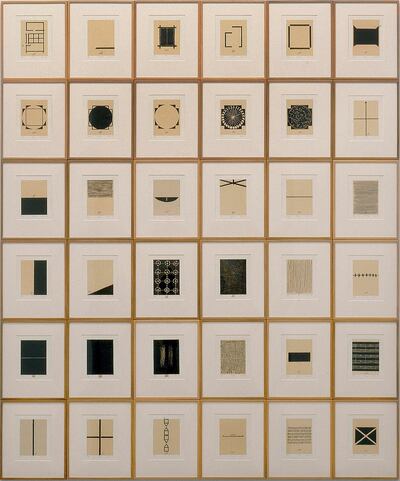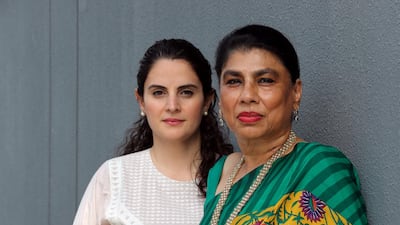"For me, Dubai is a part of expanded South Asia," says Nada Raza, the artistic director of the Ishara Art Foundation. "The art histories of this region and those of India and Pakistan and Bangladesh, are completely imbricated with one another, and there are many conversations that still need to be had."
Ishara Art Foundation, one of the few international foundations to focus solely on art from South Asia, opens tonight in a two-storey warehouse space in Dubai's Alserkal Avenue. It is the brainchild of Indian entrepreneur Smita Prabhakar, a warm woman who is already one of the most important collectors worldwide of South Asian art. Now, she is launching a space for the work in her long-time home of Dubai.
"It gives away my age," she says with a laugh. "But I've lived in Dubai for 39 years as of this year. It's my home. I have always felt that if I lived in a city – Dubai or anywhere in the world – that had been responsible for and contributed to my success, then I would do something to give back."
The Foundation will host a rotating series of exhibitions and events, with works drawn in part from Prabhakar’s collection and others on loan, in a programme put together by Raza and a small team that is still in the midst of being assembled.
Raza, who was born in the UK and has family in both India and Pakistan, began curating in the early 2000s when she lived in the UAE. In 2012 she was hired by Tate Modern as a curator with a focus on South Asian art – the first time the UK museum had a curator devoted to that area. There, Raza brought key South Asian works into the collection and developed relationships on behalf of the museum with South Asian collectors. It was through the latter remit that she and Prabhakar came into contact.
"I had come during Art Dubai to tour Smita's collection," Raza recalls. "Her regular curator was unwell, and I knew the work anyway, so said I would do the tour. But there had been a party the night before and nobody showed up. Smita very kindly gave me gluten-free bread and home-made jam, and we started talking."
When Prabhakar came up with the idea just last year to set up the foundation, she lured Raza away from Tate Modern and back to Dubai. The inaugural show, fittingly, circles around the idea of home. Titled Altered Inheritances: Home Is a Foreign Place, it brings together two Indian artists who are important to the collection: Zarina and Shilpa Gupta, who both create restrained, formal investigations drawing on poetry and the language of minimalism. “It almost curated itself,” says Raza. “There are so many formal connections between them. They both deal with borders and belonging in an emotional register. It’s not journalistic documentation, it’s not voyeuristic looking at bodies crossing the border.”

Zarina, who goes by her first name only, was born in 1937 in Aligarh. She is a key artist in the Prabhakar collection, as well as to modern Indian art. Her work addresses the absurdity of political borders, histories of violence and dislocation, and often draws on her own experiences: she left India in the 1960s and lived in Tokyo, Thailand, Paris and California before settling in New York. The artwork Home Is a Foreign Place (1999), on view in the Dubai show, is a well-known examination of the emotional tolls of migration: it consists of 36 woodblock prints, each representing a memory from her childhood home through what she calls an "ideogram".
Zarina's understanding of home as both a place and (literally) a symbol, anchors the foundation: Raza and Prabhakar chose one of the ideograms from Home Is a Foreign Place for the foundation's logo, now emblazoned upon its sign next to Alserkal Avenue's A4 space. Zarina's family home suffuses the exhibition in other ways as well: the layout of the rooms is based on the courtyard house that her family left behind in Aligarh.

Gupta, who lives in Mumbai, likewise plays with forms of language and techniques of art-making that resonate directly with South Asia, often transforming information and poetry into other states to reflect on the political histories of trade and exchange on the subcontinent. In an untitled work she shows glass bottles in which lines of poetry have been whispered into and then stopped up with corks, as part of a larger research project into how news, dissidence, and culture spread and can be quashed. In a work from 2017, she uses smuggled sari cloth from Jamdani, near the India-Bangladesh border, as a base for drawings about the area: a rumination of the absurdity of political borders on cloth from a town directly affected by them.
“The exhibition speaks to what it means to be South Asian in a subtle and nuanced way,” says Raza, “We are looking at the idea of home in and of itself, and presenting it as a complex idea, and displacement as something germane to the 20th and 21st centuries. So rather than thinking wholly about South Asia, it is how the South Asian experience speaks to a wider public. There’ll be something in the show that everyone who lives here, whether local or expat, can relate to. Living in a place where things have changed so quickly, everyone has that experience of not being able to go back to their childhood home.”
Prabhakar concurs: “I am Indian, but I don’t consider myself only Indian. This space is for everyone.”
Prabhakar says her main goal for the foundation is simply to furnish a site where people can see and learn about work they would not otherwise have come across. "I remember when I was in university, on a very tight budget, there was the United States Information Service," she says. "They ran a library and it was the only air-conditioned place in New Delhi. As a student you got a free membership, and if you came in you had to get a book and sit there. So I would sit there. And that way, coming from a very British education system, I was exposed to American writers. I never would have read, in those days, the books of Raymond Carver, whom I absolutely adore, or I never would have discovered Maya Angelou, but it was air-conditioned, and I loved reading.
“Just like that people discover things. If you make the space not intimidating, a welcoming space, they will come.”
Altered Inheritances: Home Is a Foreign Place is at the Ishara Art Foundation in Alserkal Avenue, Dubai, till June 23, 2019.


